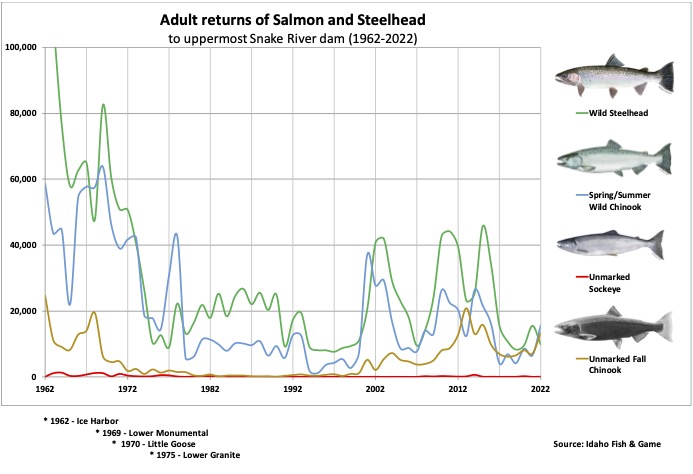forum
library
tutorial
contact

Washington Governor Signs
Dam Breaching Study Bills
by Eric Barker
Lewiston Tribune, May 18, 2023
|
the film forum library tutorial contact |

|
Washington Governor Signs
by Eric Barker
|
Governor OKs two bills that study possibility of breaching four dams
 Washington Gov. Jay Inslee put his signature to three bills recently that reach into Washington's southeastern corner.
Washington Gov. Jay Inslee put his signature to three bills recently that reach into Washington's southeastern corner.
On Tuesday, he signed a pair of budget bills that included funding that will further efforts to save salmon and steelhead by breaching the four lower Snake River dams. A day earlier, the governor signed legislation that will help rural fire departments snuff out potentially damaging wildfires.
Last year, Inslee and Sen. Patty Murray released a report that said breaching the dams is the surest way to recover the sea-going fish that are protected by the Endangered Species Act. It's a conclusion shared by many fisheries scientists and the federal government.
However, breaching the dams is controversial because of the significant negative impacts that include a loss of tug-and-barge transportation between Lewiston and downriver ports and elimination of hydropower production at a time the region is looking to transition to low-carbon energy sources. Because of that, the two powerful Democrats said the services made possible by the dams must be replaced before breaching can occur.
The bills have a combined price tag of $7.5 million, including $2 million to study replacement of the 900 average megawatts of hydropower produced annually at the dams, $500,000 to figure out the best way to keep irrigation drawn from the Snake River near the Tri-Cities flowing without the dams and $5 million to analyze alternatives for farmers to get their crops to overseas markets.
Inslee had asked legislators to include the funding in the state's transportation and operating budgets to pave the way for breaching the dams.
"These plans will enable us to strengthen and diversify our regional economy, and modernize our energy, transportation, and irrigation infrastructure as we work to stop the extinction of Snake River salmon," said Rep. Joe Fitzgibbon, House Majority Leader from West Seattle, in a news release.
Legislators from eastern Washington who oppose breaching attempted to derail the funding by diverting the money into projects designed to improve salmon and steelhead spawning habitat. But those moves proved unsuccessful.
"You can see we fight but it doesn't help us when we don't have the votes to overcome the majority party," Rep. Mary Dye, R-Pomeroy previously told the Tribune.
Dye did have a signature win during this year's sessions. For the past seven years she has been pushing a bill that would allow local and tribal fire departments to seek reimbursement from the Washington Department of Natural Resources for the cost of aviation incurred while trying to snuff fires soon after they start. This year it crossed the finish line and was signed by Inslee.
Small departments often lack the funding to pay for expensive helicopter time that can run $2,500 an hour. But helicopters can make the difference during initial attack -- the response to fires soon after they first start. When successful, they can save heaps of money. While air time is spendy, large fires that burn for weeks carry a much higher price tag, frequently running millions of dollars.
The state often was obligated to pay the big tab. When fires grow too large for local fire departments to handle, they seek help from the Washington Department of Natural Resources. When those requests are approved, known as state mobilization, the department takes over. But the process of seeking help and getting approval can take many hours. In the meantime, blazes can grow exponentially.
Now, local fire chiefs can call in private helicopter companies to assist with initial attack and pass the bill on to the state.
"In southeastern Washington, we have light flashy fuels, and it doesn't take long to end up with a huge fire running through bluffs and hard-to-access areas," said Asotin County Fire District Chief Noel Hardin in a news release. "The goal is always to get the fire out as fast and safely as possible, and the key has been from the air."
Hardin, who initially approached Dye for help on the issue, attended the bill signing with the Pomeroy Republican.
"It took a while and, although the bill isn't exactly what we had envisioned, it will accomplish much of the same goals, which is to stop a wildland fire before it gets large," said Dye in a news release. "This will give our local fire districts the ability to act quickly, saving millions of dollars in suppression costs, reducing carbon emissions, and protecting our valuable forests and range lands."
learn more on topics covered in the film
see the video
read the script
learn the songs
discussion forum
